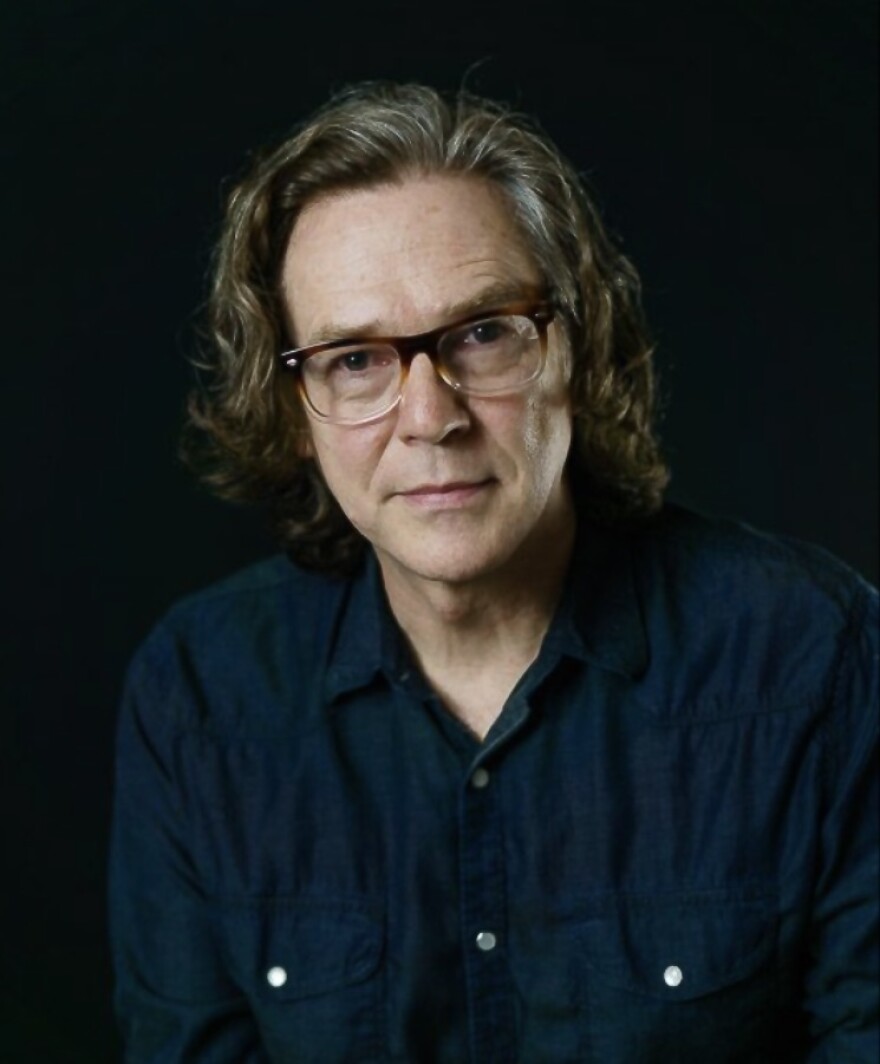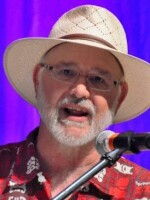Note: some listeners have experienced difficulties playing this audio using the Facebook app on mobile devices. We recommend you try listening through a browser while we address this technical issue.
Making a Difference; Connecting Through Conversation, is produced in cooperation with the Community Foundation of the Ozarks. In this segment, we listen in on a phone conversation between two men whose friendhsip remains intact despite their political differences.
Brett: "I'm Brett Miller and I grew up as a Baptist preacher's kid. And I was a pretty conservative, in fact, really conservative Republican back in the 80s and went through some changes in my thinking in my life. And probably around 2000, actually around 9/11, started to shift more to the left. Mostly these days, more of a left of center Democrat. I was a college professor and after the 2016 election, all the rancor and and almost violence in response to all of that, my wife and I quit our jobs and hit the road, went around the country talking to people about divisiveness in our political rhetoric. So it's a natural fit for me to have this conversation with Doug today."

Doug: "My name is Doug Campbell. I grew up here in Springfield for the most part, spent about 10 years in the south of St. Louis in a little town called St. Genevieve, which was a hotbed. I was a minority Republican in a Democratic county, but I grew up a very strong conservative. Very influenced by my dad, who was a deacon at the church that Dr. Miller, Brett's dad's church, and was probably his right hand person in a lot of things. And my father later kind of switched allegiances after the Reagan years. My dad later volunteered here locally and the Democratic Party, but I never made that switch. I'm a very strong conservative in my beliefs. Got to know Brett way back in high school."
Brett: "Yeah, actually, that's I think, what is really sort of the thing that draws us together the most. First of all, we have this shared history because we were pretty close back in high school, haven't seen each other that much since then. It's interesting there are these like juxtapositions how everybody's kind of flipped and changed in things, because when I was sort of transitioning more towards the Democratic side of things. In the late 90s and in the early 2000s, I wrote an occasional column for the News-Leader about religion, politics kinds of things. And Euell, your dad would always after I wrote some that had something published in the paper, he would call me or write me a letter encouraging me, and being very supportive. And I don't think we really talked about politics at all when we were younger. We kind of reconnected on Facebook six or seven years ago on social media. And the first few times we kind of mixed it up a little bit about politics, I was surprised because I just sort of assumed that, you know, you had followed in your dad's tradition."
Doug: "Right. I can remember kind of the first time that we had a conversation on Facebook, so to speak. I think you'd had made some point. I don't remember the topic, and I could remember posting a meme about it. And you responded by 'Don't do a drive by on me, explain what you're talking about'. And so that really engaged us at that point."
Brett: "Yeah, I went back and I couldn't remember a lot of the exchanges that we had, but I did notice in some of our messages to each other. I remember one of the first ones that I came back and kind of apologized to you, because I think I hit back pretty hard about something. And, you know, I that's sort of my style of and being really truthful and adhering as I see it to the facts and holding people accountable for that. And sometimes it can seem a little rougher perhaps, than I mean it."
Doug: "I don't do a lot of politics on Facebook. It's kind of like one of those topics. Religion and politics, you don't you don't engage in all the time. But I think when we do if if I come and it's usually strikes a nerve with me in some type of way, but I always try to keep it civil. Trying to get my point across not in a, you know, demeaning way. And I think you've tried to do that in your response, and I think, you know, more of us need to do that type of thing."
Brett: "Yeah, I always really appreciated, and I think my appreciation grew for you, as I saw more and more people just becoming more like trolls. Both on the left and the right."
Doug: "Right. Yes, oh, absolutely."

Brett: "Just dropping bombs just to blow up relationships. And and I always got a sense that when we engaged, it was, you know, we were we weren't letting either of either one off the hook. But there was a simmering below the surface was a respect for each other. We weren't going to blow up the relationship over and over a disagreement. Which is, I think, increasingly rare because I think we're just starting this time now where you've just all kinds of stories of people whose families have been torn apart and friendships have been torn apart."
Doug: "That's an interesting point. I think early on politics on Facebook kind of taught me a lesson because I used to post a lot more politically. And there was a girl that I grew up with in my neighborhood. I wasn't as close friends with her as I was her sister, but had a lot of respect for the family. And we had kind of gotten into it. Not like like bad getting into it, but, you know, going back and forth on Facebook. And I found out she was no longer my friend. And I'm sure it was because of the political banter. So that kind of had an impact on me. It's like I just kind of, you know, did a self-examination of myself on social media, of, you know, why would I do that? You know, I mean, I've known these people since I was in kindergarten, had interactions with the with all the family. You know, why would I want to put my view, or is it that important that I get my point across, or did I cross the line? Obviously, I think that I crossed the line, but it taught me a big lesson at that point. And I think you, Brett, taught me a lesson with that first interaction. You know, 'Don't come to drive by on my timeline. At least express your your point.' And I think we can all do that and still be civil. So that's kind of what I learned from the whole thing."
Brett: "And I remember several times when when we would disagree on Facebook that you would say something that I would be like, OK, I need to because it's so like between the algorithms and all the self-selection, we've all ended up in our little echo chambers where we just get our perspective reinforced constantly. And so we don't often have an opportunity to hear a perspective from somebody else and especially somebody else that we respect. So when you would pop up and say something, I'm like, OK, I got to stop in and regroup here and re-evaluate."
Doug: "I think it's just going to make everything better if we just share ideas, but don't take it so personal. I mean, I don't think anybody has the real intent of being personal, although some people do. I've got a friend out in California that used to be in Georgia that I used to work with. Somebody that I totally admire, he was one of the best sales guys that I ever worked with. Very liberal. He had commented on something the other day on the Trump tax returns, and I made a comment and kind of a different viewpoint. And I think it was his cousin in New York had posted something. 'You're a real idiot.' You know, I really wanted to engage the guy, but I'm too respectful of my friend Steve. So you can't engage people that if they're so mad, just stay away from the conversation. You're better off just not even talking about it."
Brett: "Sure. And I you know, I certainly found myself in situations where I want to say those kinds of things. But so far, for the most part, I've been pretty good about backing up and just thinking of it in terms of, I don't like what this is doing to me. Regardless of what I think may be true about this other person, and regardless of how weak I think their argument is or whatever, when I when I devolve into name calling, then I've become something else. Like a different version of me that I don't want to be."

Brett: “You know, that's taking on more potency for me recently because, you know, I just had my first grandchild, and it's impressed upon me the importance of what kind of model I provide for the next generations. And so being sort of careful and vigilant to not let the process turn me into a version of me that I don't want to be. And that can be hard sometimes because it's real. I mean, all the forces around us seem to be pretty determined to make sure that we stay more polarized and get more angry at each other.”
Brett: “So, Doug, I really appreciate you committing the time to come and talk about this. I think it's a rare thing when in this day and age, when people occupy these very different political positions to be willing to come and even get spirited about some things, but to remain committed to each other. And I think one of the things that makes it work with us as well, is we have a pretty good sense of humor, a shared sense of humor. I'm glad you're my friend, and I'm glad that you keep showing up and pushing me sometimes.”
Doug: “Well, I appreciate likewise as well. I appreciate you and Mike here inviting me to come today and share my two cents. I think it's important that we all have great discussions, and, you know, they can be productive. We're not going to agree, we can agree to disagree and shake hands and still have a cup of coffee, and talk about old times and look to new times. So that’s what I look forward to. And I appreciate you being my friend and respect your family a lot. And definitely it's been fun.”
Doug Campbell and Brett Miller for Making A Difference; Connecting Through Conversation, produced in cooperation with the Community Foundation of the Ozarks. Information at www.cfozarks.org.
This and archived editions of the Making a Difference Series, are at KSMU.org. I'm Mike Smith.




